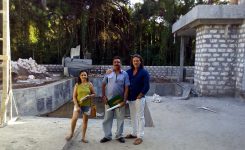CLAUDIO MODOLA DESIGN FZ LLC
Taking maximum advantage of a slow property market
March 19, 2019 - CLAUDIO MODOLA DESIGN FZ LLC
Taking maximum advantage of a slow property market
If someone asked you if you would rather purchase a plot of land for $1,000,000 or $750,000 you would probably say $750,000. Why spend more than you have to? Yet, in reality, because we tend to look at what others are doing when making our decisions, many people purchase when prices are higher, because everyone else is buying and avoid buying when prices are lower (during slow property markets), because no one else is buying.
Concerns about further depreciation have also kept many people from purchasing land or property during slow markets. However, by recognizing the opportunities slow property markets present, prospective buyers can break away from the pack and take advantage of excellent deals as far as acquisition, design and construction are concerned.
Opportunities
Buying, designing and building during a slow market is advantageous for many reasons:
- Vendors often set their asking prices lower than the prices of similar property that sold previously. Vendors are also often more willing to offer other allowances, such as paying for legal costs, surveys etc
- Vendors are more likely to accept offers for less than the asking prices, unlike during a hot property market, where you may have to offer more than the asking price to secure the property.
- Because it is less likely for property in a slow market to get multiple offers you have somewhat more time to search before deciding whether or not to make an offer.
- Prime real estate such as a water-front property, which were previously out of reach may suddenly become a credible investment for the future.
- High calibre architects and interior designers may consider undertaking smaller projects or refurbishments that they would generally not undertake in hot market conditions. Thereby allowing you to secure a quality design, with a high level of customised attention from a renowned specialised team which will generally translate to a 30% increase in eventual property value.
- Top tier quality building contractors will consider smaller projects and will also generally tend to slash profit margins, thereby significantly reducing your total cost of construction, without compromising on quality and finish.
How to know if housing market is slow
You may be asking yourself, “How do I know if the market is slow or not?” There are several signs to look for. Research online or look in your local newspaper. If the property market is slow often agencies and newspapers will write about it. Also, check with local estate agents and see how many price reductions are being offered particularly in prime positions. If you are working with a real estate agent, he or she should be able to do much of the work for you. Real estate agents have access to a listing service that shows how long properties have been on the market and if there have been any price adjustments.
Further depreciation
One of the reasons that many people avoid purchasing a home in a slow property market is because they are worried the value of the property will depreciate further. No one wants to purchase a $750,000 plot, only to have it be worth $730,000 a month later. Unfortunately, while you can usually tell if a market is slow or not, you cannot tell when the bottom will hit. Individuals or investors who wait for the rock bottom prices often actually wait too long and purchase when prices are on the rise. If you are planning to develop a parcel of land, you will require a couple of years to complete design and construction therefore further depreciation does not need to be a major concern. You are getting a better deal than many people who have bought before you, and long-term the value of your property will almost certainly rise.
Current Market conditions, UAE & Italy
Globally the outlook for 2019 is slow with recovery expected towards the end of the year.
In Dubai, property prices are at a three-year low and are expected to rise ahead of Expo 2020 due to its consequent effect on the economy, a further contributing factor being elevated demand as a result of the introduction of new government incentives to encourage expatriate purchasing.
In Italy prices have decreased by about 30-35% compared to the beginning of 2008, however in recent years the market reached the bottom and prices are beginning to recover specifically in areas of interest to international buyers such as Puglia and Tuscany. The luxury property market in Italy is also expected to receive a significant boost as a result of the new “non-dom” regime which will kick into gear this year, resulting in a growing band of wealthy migrants enjoying “la dolce vita” in
return for a fixed tax payment of €100,000 on their global income.
Therefore, for the savvy individual, now in an ideal time to maximise profits before, as expected, demand drives prices up.
Should you wish to seize the moment and realise your property investment objectives before the market recovers, get in touch and on enquiries@claudiomodoladesign.com or call :-
UAE: + 972 55 484 7188
Italy: + 39 339 357 3420
Kenya: + 254 703 114 314









